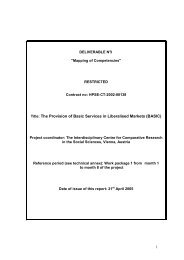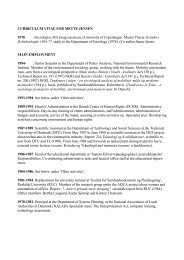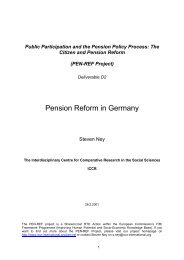The Housing Dimension of Welfare Reform - the ICCR
The Housing Dimension of Welfare Reform - the ICCR
The Housing Dimension of Welfare Reform - the ICCR
You also want an ePaper? Increase the reach of your titles
YUMPU automatically turns print PDFs into web optimized ePapers that Google loves.
<strong>the</strong> experience gained through <strong>the</strong> provision <strong>of</strong> services and feedbacks<br />
gained from clients and o<strong>the</strong>r relevant actors. In some way <strong>the</strong><br />
programmes run by social services are thus treated as ‘social<br />
experiments’ and on this basis quality criteria and monitoring procedures<br />
are elaborated for future projects.<br />
Indeed, <strong>the</strong> case studies undertaken in <strong>the</strong> EUROHOME-IMPACT<br />
project have revealed that social services running programmes targeting<br />
<strong>the</strong> socially excluded have over <strong>the</strong> years developed an evaluation culture<br />
along <strong>the</strong> lines outlined above. However most have not succeeded in<br />
systematising or routinising related procedures. Seen from this<br />
perspective, <strong>the</strong> over-reliance <strong>of</strong> many <strong>of</strong> <strong>the</strong>se social services on key<br />
resource persons (usually <strong>the</strong>ir directors) is at <strong>the</strong> same time a strength<br />
and a weakness. It is a strength because social programmes <strong>of</strong>ten<br />
necessitate <strong>the</strong> personal commitment <strong>of</strong> individuals to ensure <strong>the</strong>ir<br />
successful operation. It is a weakness because this over-reliance<br />
sometimes also means that adequate attention is not given to routine<br />
procedures that ‘outlive’ so-to-speak <strong>the</strong> personal commitment <strong>of</strong><br />
specific individuals thus also ensuring that expertise is transferred topdown<br />
also to middle-management or lower levels <strong>of</strong> staff, thus becoming<br />
institutionalised towards <strong>the</strong> avoidance <strong>of</strong> <strong>the</strong> negative unintended effects<br />
<strong>of</strong> personal discretion practices.<br />
Role <strong>of</strong> users<br />
Within social services we can observe that attention is increasingly<br />
placed on receiving feedback from users or clients about how services are<br />
run, <strong>the</strong>ir strengths and weaknesses.<br />
<strong>The</strong>re are two types <strong>of</strong> user involvement: first, through <strong>the</strong> organisation<br />
<strong>of</strong> standardised surveys among <strong>the</strong> service’s clientele; second, through<br />
structured dialogues between users and providers <strong>of</strong> services that<br />
emphasise empowerment. <strong>The</strong> second approach is recognised in <strong>the</strong><br />
literature as a better way to promote a deeper understanding <strong>of</strong> decision<br />
and implementation processes and how <strong>the</strong>y affect users and thus to<br />
effect relevant organisational changes <strong>of</strong> <strong>the</strong> services. This second<br />
approach is however more difficult to organise in practice given that <strong>the</strong><br />
users’ <strong>of</strong> social services are not organised in any way and not used to<br />
providing feedback to service providers in a structured dialogue setting.<br />
Never<strong>the</strong>less, <strong>the</strong> experiences made in <strong>the</strong> course <strong>of</strong> <strong>the</strong> EUROHOME-<br />
IMPACT project, which involved as already mentioned group<br />
discussions with users and service providers following <strong>the</strong> ‘focus group’<br />
method, are extremely encouraging in this connection. Our research has<br />
shown that it is possible to set up and organise such structured dialogues<br />
and that <strong>the</strong> users <strong>of</strong> social services are able, with some mediation<br />
support, to both articulate concerns and problems as well as engage in<br />
EUROHOME-IMPACT FINAL REPORT 58









